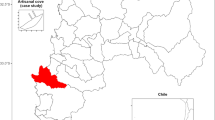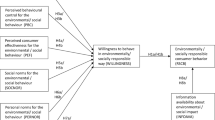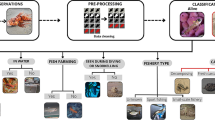Abstract
Resource managers benefit from knowledge of angler support for fisheries management strategies. Factors including angler values (protection, utilitarian, and dominance), involvement (attraction, centrality, social, identity affirmation, and expression), catch-related motivations (catching some, many, and big fish, and keeping fish), satisfaction, agency trust, and demographics may relate to fisheries management preferences. Using results from a mail survey of Minnesota resident anglers, we explored how these factors were related to budget support for fish stocking relative to habitat protection/restoration. Results suggest that values, angler involvement, catch orientation, satisfaction, total and recent years fishing, age, and education influence relative support for stocking versus habitat protection/restoration. Utilitarian values, angling centrality, an orientation to catch many fish, satisfaction with the number of fish caught, number of recent years fishing, and age positively related to support for stocking over habitat management, while protection values, attraction to angling, total years fishing, and education level were negatively related to relative support for stocking.
Similar content being viewed by others
References
Aas O, Vitterso J (2000) Re-examining the consumptiveness concept: some suggestions from a confirmatory factor analysis. Human Dimens Wildl 5:1–18
Aitchison J (No date) A concise guide to compositional data analysis. Department of Statistics, University of Glasgow, UK
Arlinghaus R (2006) On the apparently striking disconnect between motivation and satisfaction in recreational fishing: the case of catch orientation of German anglers. North Am J Fish Manag 26:592–605
Arlinghaus R, Beardmore B, Riepe C, Meyerhoffl J, Pagel T (2014) Species-specific preferences of German recreational anglers for freshwater fishing experiences, with emphasis on the intrinsic utilities of fish stocking and wild fishes. J Fish Biol 85:1843–1867
Arlinghaus R, Cowx IG (2008) Meaning and relevance of the ecosystem approach to recreational fisheriesmanagement. Emphasis on the importance of the human dimension. In: Aas O (ed) Global challenges inrecreational fisheries. Blackwell Publishing, Oxford, pp 56–74
Arlinghaus R, Mehner T (2004) A management orientated comparative analysis of urban and rural anglers living in a metropolis (Berlin, Germany). Environ Manag 33:331–344
Arlinghaus R, Mehner T (2005) Determinants of management preferences of recreational anglers in Germany: habitat management versus fish stocking. Limnolgica 35:2–17
Batista-Foguet JM, Ferrer-Rosell B, Serlavos R, Coenders G, Boyatzis RE (2015) An alternative approach to analyze ipsative data. Revisiting experiential learning theory. Front Psychol 6(Article1742):1–10
Beardmore B, Hunt LM, Haider W, Dorow M, Arlinghaus R (2015) Effectively managing angler satisfaction in recreational fisheries requires understanding the fish species and the anglers. Can J Fish Aquat Sci 72:500–513
Bonett DG, Wright TA (2015) Cronbach’s alpha reliability: interval estimation, hypothesis testing, and sample size planning. J Organ Behav 36:3–15
Bruskotter JT, Fulton DC (2008) Minnesota anglers’ fisheries-related value orientations and their stewardship of fish resources. Human Dimens Wildl 13:207–221
Bryan H (1977) Leisure value systems and recreational specialization: the case of trout fishermen. J Leis Res 9:174–187
Carlin CS, Schroeder SA, Fulton DC (2012) Site choice among Minnesota walleye anglers: the influence of resource conditions, regulations and catch orientation on lake preference. North Am J Fish Manag 32:299–312
Connelly NA, Keeler S, Knuth BA (2013) Understanding angler preferences for species and water bodies: importance for New York’s future fisheries management. Human Dimens Wildl 18:386–402
de Vaus D (2002) Analyzing social science data: 50 key problems in data analysis. Sage, London
Dillman D (2000) Mail and internet surveys: the tailored design method. J Wiley and Sons, New York
Ditton RB, Loomis DK, Choi S (1992) Recreation specialization: re-conceptualization from a social worlds perspective. J Leis Res 24:33–51
Dorow M, Arlinghaus R (2012) The relationship between personal commitment to angling and the opinions and attitudes of German anglers towards the conservation and management of the European eel Anguilla anguilla. North Am J Fish Manag 32:466–479
Dorow M, Beardmore B, Haider W, Arliinghaus R (2009) Using a novel survey technique to predict fisheries stakeholders’ support for European eel (Anguilla anguilla L.) conservation programs. Biol Conserv 142:2973–2982
Dorow M, Beardmore B, Haider W, Arlinghaus R (2010) Winners and losers of conservation policies for Europen eel, Auguilla anguilla: an economic welfare analysis for differently specialised eel anglers. Fish Manag Ecol 17:106–125
Eisinga R, te Grotenhuis M, Pelzer B (2013) The reliability of a two-item scale: Pearson, Cronbach or Spearman-Brown? Int J Public Health 58:637–642
Field A (2009) Discovering statistics using SPSS, 3rd edn. Sage, London
Fisher MR (1997) Segmentation of the angler population by catch preference, participation, and experience: a management-oriented application of recreation specialization. North Am J Fish Manag 17:1–10
Fulton DC, Manfredo MJ, Lipscomb J (1996) Wildlife value orientations: a conceptual and measurement approach. Human Dimens Wildl 1:24–47
Fujitani ML, McFall A, Randler C, Arliinghaus R (2016) Efficacy of lecture-based environmental education for biodiversity conservation: a robust controlled field experiment with recreational anglers engaged in self-organized fish stocking. J Appl Ecol 53:25–33
Gelman A (2007) Struggles with survey weighting and regression modeling. Stat Sci 22:153–161
Graefe AR (1980) The relationship between level of participation and selected aspects of specialization in recreational fisherman. Unpublished Doctoral Dissertation, Texas A&M University
Havitz ME, Dimanche F (1990) Propositions for guiding the empirical testing of the involvement construct in recreational and tourist contexts. Leis Sci 12:179–196
Havitz ME, Dimanche F (1997) Leisure involvement revisited: conceptual conundrums and measurement advances. J Leis Res 29:245–278
Havitz ME, Dimanche F (1999) Leisure involvement revisited: drive properties and paradoxes. J Leis Res 31:122–149
Havitz ME, Mannell RC (2005) Enduring involvement, situational involvement, and flow in leisure and non-leisure activities. J Leis Res 37:133–151
Hunt LM, Morgan G (2005) Examining policy preferences of recreationists: a case of a fisheries management plan. Leisure 29:379–397
Hutt CP, Bettoli PW (2007) Preferences, specialization, and management attitudes of trout anglers fishing in Tennessee tailwaters. North Am J Fish Manag 27:1257–1267
Kim S, Scott D, Crompton JL (1997) An exploration of the relationships among social psychological involvement, behavioral involvement, commitment, and future intentions in the context of birdwatching. J Leis Res 29:320–341
Kyle GT, Absher JD, Norman W, Hammitt WE, Jodice L (2007a) A modified involvement scale. Leis Stud 26:399–427
Kyle G, Graefe A, Manning R, Bacon J (2003) An examination of the relationship between leisure activity involvement and place attachment among hikers along the Appalachian Trail. J Leis Res 35:249–273
Kyle G, Norman W, Jodice L, Graefe A, Marsinko A (2007b) Segmenting anglers using their consumptive orientation profiles. Human Dimens Wildl 12:115–132
Levi M, Stoker L (2000) Political trust and trustworthiness. Annu Rev Political Sci 3:475–507
McCormick JL, Porter TK (2014) Effect of fishing success on angler satisfaction on a central Oregon rainbow trout fishery: implications for establishing management objectives. North Am J Fish Manag 34:938–944
McIntyre N, Pigram JJ (1992) Recreation specialization reexamined: the case of vehicle based campers. Leis Sci 14:3–15
Metropolitan Council (2017) The TwinCities region. Available at https://metrocouncil.org/About-Us/Who-We-Are/The-Twin-Cities-region.aspx. Accessed 22 November 2017
Minnesota Department of Natural Resources (MNDNR), Section of Fisheries (2009) The water’s edge: helping fish and wildlife on your lakeshore property. St. Paul
Minnesota Department of Natural Resources (MNDNR), Section of Fisheries (2010) Fishing: get in the habitat! Leader’s guide. St. Paul
Minnesota Department of Natural Resources (MNDNR), Section of Fisheries (2013) Fish habitat plan: a strategic guidance document. St. Paul
Minnesota Department of Natural Resources (MNDNR), Section of Fisheries (2016) Division of fish and wildlife long range plan for fisheries management. Available at http://files.dnr.state.mn.us/aboutdnr/reports/strategic-documents/fisheries-managment-long-range-plan.pdf. Accessed 27 April 2016
Needham MD, Vaske JJ (2008) Hunter perceptions of similarity and trust in wildlife agencies and personal risk associated with chronic wasting disease. Soc Nat Resour 21:197–214
Needham MD, Vaske JJ, Manfredo MJ (2004) Hunters’ behavior and acceptance of management actions related to chronic wasting disease in eight states. Human Dimens Wildl 9:211–231
Oh C-O, Ditton RB (2008) Using recreation specialization to understand conservation support. J Leis Res 40:556–573
Oh CO, Ditton RB, Gentner B, Riechers R (2005) A stated preference choice approach to understanding angler preferences for management options. Human Dimens Wildl 10:173–186
Paudyal R, Poudyal NC, Bowker JM, Dorison AM, Zarnoch SJ, Green GT (2015) A value orientation approach to assess and compare climate change risk perception among trout anglers in Georgia, USA. J Outdoor Recreat Tour 11:22–33
Pradhananga A, Davenport MA, Seekamp E, Bundy D (2015) Preventing the spread of aquatic invasive species: boater concerns, habits, and future behaviors. Human Dimens Wildl 20:381–393
Schroeder SA, Cornicelli L, Fulton DC, Grund MD (2014) What predicts support for antler point restrictions? Human Dimens Wildl 19:301–318
Schroeder SA, Fulton DC (2013) Comparing catch orientations among walleye, northern pike and bass anglers. Human Dimens Wildl 18:355–372
Schroeder SA, Fulton DC (2014) Fishing for northern pike in Minnesota: a comparison of anglers and dark house spearers. North Am J Fish Manag 34:678–691
Schroeder SA, Fulton DC (2016) Voice, perceived fairness, agency trust and acceptance of management decisions among Minnesota anglers. Soc Nat Resour 30:569–584
Siegrist M, Cvetkovich G, Roth C (2000) Salient value similarity, social trust, and risk/benefit perception. Risk Anal 20:353–362
Smith JW, Leahy JE, Anderson DH, Davenport MA (2013) Community/agency trust and public involvement in resource planning. Soc Nat Resour 26:452–271
Sutton SG, Ditton RB (2001) Understanding catch-and-release behavior among U.S. Atlantic bluefin tuna anglers. Human Dimens Wildl 6:49–66
Terwel BW, Harinck F, Ellemers N, Daamen DDL (2010) Voice in political decision-making: the effect of group voice on perceived trustworthiness of decision makers and subsequent acceptance of decisions. J Exp Psychol Appl 16:173–186
Thió-Henestrosa S, Martín-Fernández JA (2005) Dealing with compositional data: the freeware CoDaPack. Math Geol 37:777–797
Thomas AS, Milfont TL, Gavin MC (2015) What determines fishers’ knowledge of and attitudes towards regulations? A case study from the Marlborough Sounds. New Zealand. Mar Policy 15:547–554
van Eijnatten FM,van der Ark LA,Holloway SS,(2015) Ipsative measurement and the analysis of organizational values: an alternative approach for data analysis Qual Quant 49:559–579
Vaske JJ, Donnelly MP (1999) A value-attitude-behavior model predicting wildland preservation voting intentions. Soc Nat Resour 12:523–537
Vaske JJ, Needham MD, Stafford NT, Green K, Petchenik J (2006) Information sources and knowledge about chronic wasting disease in Colorado and Wisconsin. Human Dimens Wildl 11:191–202
Vaske JJ, Timmons N, Beaman J, Petchenik J (2004) Chronic wasting disease in Wisconsin: hunter behavior, perceived risk, and agency trust. Human Dimens Wildl 9:193–209
von Lindern E, Mosler HJ (2014) Insights into fisheries management practices: using the theory of planned behavior to explain fish stocking among a sample of Swiss anglers. PLoS ONE 9(12):1–20
Welcomme RL, Bartley DM (1998) Current approaches to the enhancement of fisheries Fisheries Management and Ecology 5:351–382
Author information
Authors and Affiliations
Corresponding author
Ethics declarations
Conflict of interest
The authors declare that they have no conflict of interest.
Rights and permissions
About this article
Cite this article
Schroeder, S.A., Fulton, D.C., Altena, E. et al. The Influence of Angler Values, Involvement, Catch Orientation, Satisfaction, Agency Trust, and Demographics on Support for Habitat Protection and Restoration Versus Stocking in Publicly Managed Waters. Environmental Management 62, 665–677 (2018). https://doi.org/10.1007/s00267-018-1067-9
Received:
Accepted:
Published:
Issue Date:
DOI: https://doi.org/10.1007/s00267-018-1067-9




